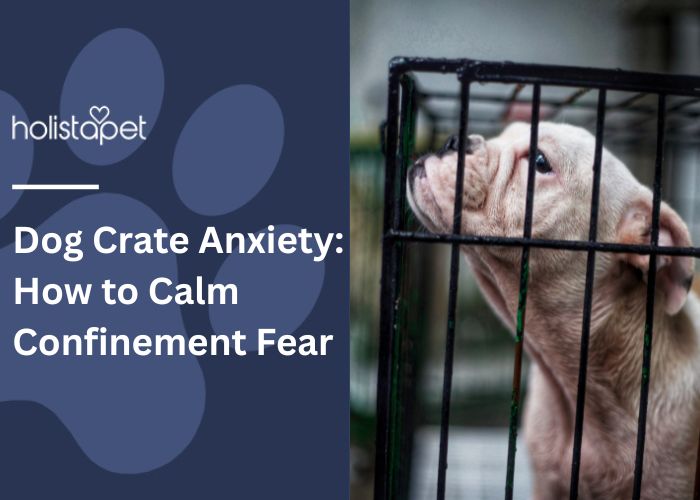Do dogs get sore after a big day of play? Yep—just like us after leg day!
Dogs don’t go to the gym, but high-energy activities like long walks and play sessions can leave them feeling fatigued. When canine muscles work overtime, it often results in muscle soreness or discomfort during their recovery.
Ever notice your pup moving a bit slower or hesitating to hop on the couch? That could be muscle soreness kicking in. In this guide, you'll learn how to spot it, what causes it, and how to help your dog bounce back comfortably.
Can Dogs Experience Muscle Soreness?

Yes, dogs can experience muscle soreness, especially after getting too much exercise. If your pup played hard or had an extra-long walk, sore muscles may follow. Like canine athletes, their dog's muscles need time to rest and recover, just like yours do after a workout. Don't be surprised if they move slower the next day!
What Causes Sore Muscles in Dogs?
Muscle soreness in dogs can happen for many reasons. Here's what may lead to that stiffness:
- Sprinting too fast during play
- Long hikes on unfamiliar terrain
- Weekend warrior syndrome
- Tight muscles from overuse
- Skipping warm-ups before training
- Poor fitness level
- Rear legs: excessive exercise
- Sudden change in activity levels
Are Some Breeds More Prone to Muscle Soreness?
Absolutely. Some breeds are more likely to experience muscle soreness. Too much activity can take a toll on senior pups and large dogs like German Shepherds and Labradors. Smaller pups with endless energy, like the Australian Shepherd running nonstop, can overdo it, too. A dog's need for routine helps avoid overexertion and sore muscles.
Sore Muscles vs. Injury – What's the Difference?
Sore muscles show up as mild stiffness or slow movement after play. Injuries hit harder—think limping, yelping, or not wanting to move at all. If your dog suffers more than a day or two, that's not just muscular pain and stiffness. It could mean something more serious than basic muscle soreness. Watch for changes that stick around.
Common Causes of Muscle Soreness in Dogs
Muscle soreness doesn't always come from a wild game of fetch. Sometimes, it's the little things that add up—getting too much exercise, skipping a warm-up, or just aging bones doing their thing. In the next few sections, we'll dig into what causes sore muscles and what every pet parent should look out for.
Overexertion From Play or Exercise
Dogs love to run, chase, and zoom like little rockets. But too much of a good thing can backfire. Overdoing playtime or walks can leave your dog's muscles tired and sore. This kind of muscle soreness shows up when a dog is getting too amped during training sessions or just being a weekend warrior. You may notice stiffness or limping after all that fun. That's the price of getting too much exercise.
Aging and Joint Stiffness
With time, it’s normal for dogs to lose some of their pep and energy. You might see signs like joint pain and fatigue, especially after cooler weather or long walks. Their joints are particularly susceptible to tight muscles and everyday movement can become a bit of a struggle. Supporting those joints with smart wellness choices can help your pup stay mobile and comfy for longer.
Here are some great products we recommend for aging dogs needing extra joint support:
- CBD Dog Treats + Joint and Mobility Care. These crunchy treats blend CBD, Turmeric Root, and Boswellia to support joint health and ease everyday muscle soreness.
- CBD Mobility Chews for Dogs. Soft and flavorful, these chews help soothe tight muscles and make movement easier for dogs dealing with joint aches.
Poor Warm-Up or Cool-Down
Jumping straight into fetch without warming up? That's a fast track to sore muscles. Just like canine athletes, dogs need a little prep before action and some wind-down time afterward. Skipping a warm-up or cool-down routine increases the risk of overextension in dogs, excessive exercise in the rear legs, and even soreness around the stifle knee joints, including the hips. A few minutes of light walking before and after play can make a huge difference.
Underlying Health Conditions
Sometimes, it's not just exercise that's to blame. Muscle soreness can hide deeper issues, such as:
- Degeneration of joint tissues
- Dog's pads are infected
- Condition health history breed
- Tear on paw pads
- Muscle weakness from past injuries
- See swelling or pus
- Dog suffers from ongoing soreness
Always check for changes in behavior. If your dog rests following excessive movement but still seems off, a vet check may help uncover what's going on.
Signs Your Dog May Have Sore Muscles
Dogs don't always make it obvious when something's bothering them. If you're seeing small changes in how they move or act after a long walk or play session, those could be signs of muscle soreness. Paying attention to these little shifts can help any pet parent catch discomfort early.
Limping or Stiff Movements
If your dog starts walking like they've just climbed a mountain, that's a big clue. Limping or stiff legs after activity is one of the easiest ways to spot sore muscles. For dogs with rear legs, excessive exercise often causes discomfort through choppy steps or slow movements. It's common in canine athletes who push themselves a little too hard during play.
Whining, Shaking, or Refusing Activity
Some dogs get vocal or shaky when they don't feel their best. Whining, trembling, or hiding away instead of playing could be their way of saying enough is enough. When a dog is getting too much action without enough rest, you might notice they start skipping walks or acting off. These signs often show up following excessive exercise.
Sensitivity When Touched
Dogs usually love a good belly rub, but if they're suddenly pulling away or twitching when you pet them, something might be off. Tight muscles can make common spots feel tender. If your pup reacts when you press on their back or legs, it could be a sign they're dealing with muscular pain and stiffness from training sessions or rough play.
How to Comfort Muscle Soreness in Dogs
Helping your pup feel better doesn't have to be tricky. There are easy ways to ease sore muscles and help your dog bounce back. From cozy rest time to calming support, these tips will keep your dog comfy and moving with less effort. Let's take a look at how to help.
Gentle Rest and Recovery Time
Rest is the best first step. Give your dog time to chill after getting too much exercise. A calm, comfy spot encourages healing and keeps muscle soreness from getting worse. A dog rests following excessive movement often recovers quicker than those pushed to do more. Skipping play for a day or two can make a big difference in how their joints limber, promote cardiovascular ease and comfort.
Warm Compress or Light Massage
Warmth can ease tight muscles and help your dog feel more relaxed. Try placing a warm towel on the sore spot or gently massaging their legs in small circles. These simple moves help muscular pain and stiffness and encourage blood flow. Great for canine athletes after big days, this routine supports faster recovery and promotes comfort without needing anything fancy.
CBD Products for Soothing Lasting Support

CBD is a natural compound from hemp plants that may support soreness relief, mood balance, and relaxation in dogs. Our broad-spectrum CBD products contain no THC, so your dog gets the benefits without any intoxicating side effects.
- CBD Calming Chews for Dogs. These soft chews combine CBD, chamomile, and L-tryptophan to help your dog relax after long play sessions. Great for pet parents dealing with overly excited pups or those with tight muscles from excessive exercise.
- CBD Wellness Dog Treats. Packed with CBD, blueberries, and flax seeds, these vegan treats offer daily support. They're a good option for dogs who may experience muscle soreness while also promoting overall health.
Both treat options support soreness relief while also helping your dog relax and calm down naturally.
Avoiding High-Impact Play
Some activities can push your dog too far. Games that involve constant jumping, sharp turns, or fast sprints may lead to muscle soreness. Most dogs with straight rear legs who are constantly on the move are especially at risk. Instead, swap out intense play for gentle walks or puzzle games. This helps prevent overextension in dogs, keeps those joints limber, and promotes cardiovascular strength without the wear and tear.
Can Sore Muscles Require a Vet's Help?
Usually, sore muscles fade after a little rest. But if your dog suffers more than a couple of days or you spot swelling, limping, or whining that won't stop, it's best to check in with your vet.
Preventing Muscle Soreness in the Future
Signs of overextension aren't always loud—but they're there if you know where to look. Preventing sore muscles before they start is one of the smartest ways a pet parent can support their dog's long-term comfort and mobility.
- Proper warm-ups and cool-downs. Start with a slow walk before play and end with light movement to ease tight muscles.
- Consistent exercise routine. Keeping a steady pace with daily training sessions and walks helps avoid weekend warrior syndrome.
- Joint-friendly supplements. Daily wellness treats with CBD, turmeric, or Boswellia can support joint function. These ingredients help keep joints limber and promote cardiovascular health while easing tension in the dog's muscles.
Final Thoughts – Do Dogs Get Sore Muscles?
Yes, they do and now you know exactly what to watch for and how to help. Too much exercise can leave your dog sore, but steady activity, thoughtful care, and supportive wellness products can help them stay comfortable.
At HolistaPet, we offer CBD treats, calming chews, mobility support, and other gentle products to keep your dogs and cats feeling their best. A little love (and the right snack) goes a long way toward happy tails and comfy stretches.


 CBD Oil for Dogs - Fast Acting
CBD Oil for Dogs - Fast Acting
 Chicken Flavored CBD Oil For Dogs - Easy Dose
Chicken Flavored CBD Oil For Dogs - Easy Dose
 Salmon Flavored CBD Oil For Dogs - Highly Rated
Salmon Flavored CBD Oil For Dogs - Highly Rated
 CBG Oil for Dogs and Cats - Loved by Thousands
CBG Oil for Dogs and Cats - Loved by Thousands





Leave a comment
All comments are moderated before being published.
This site is protected by hCaptcha and the hCaptcha Privacy Policy and Terms of Service apply.